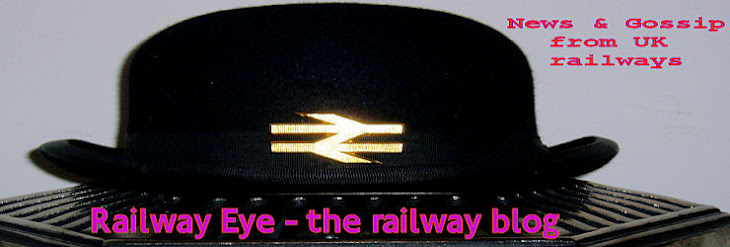This from Depot Master...
Aww!
The 'new arrival'!!
Tuesday, 19 March 2013
Silver Stump Watch - Manchester Piccadilly
ORR parks tanks on RDG's lawn
Good news for fans of needless duplication on the railway!
This from the ORR and DfT:
ORR and DfT recognise that more can be done to improve the way performance of the rail industry as a whole is monitored and to promote stronger incentives for train operating companies to reduce costs and collaborate effectively with Network Rail. To facilitate this, ORR will do more to highlight whole industry performance and cost issues, and ensure they are addressed. These changes will help Government, the Regulator and the industry to improve performance, tackle waste and inefficiency and improve services for passengers.
Quite so.
So pray tell what is the role of the RDG in today's new, exciting, streamlined and post McNulty railway?
UPDATE: This from the Horseferry Inquisition...
In answer to Eye’s question of what RDG is for, I refer you to the published responses to the TSC Rail 2020 report, from DfT and ORR, as below:
Recommendation 7. We recommend that the DfT and ORR keep a close eye on the work of the RDG to ensure that it acts in the best interests of the farepayer and taxpayer, rather than of established rail interests. (Paragraph 38)
DfT response:
The Department agrees with this recommendation. The Government welcomed the establishment of the Rail Delivery Group (RDG). The establishment of an authoritative and effective voice, able to lead for the rail industry, is crucial if the industry is to meet the challenge of reducing the cost of running the railway. The formalisation of the RDG puts the organisation in the best place to take forward whole industry leadership.
ORR response:
We support the formation of the RDG which was established in response to the McNulty report's view that many of the barriers to improving efficiency across the railway could be addressed by a high-level cross-industry leadership body charged with driving forward change. To facilitate formation of the RDG we implemented a new licence condition obliging Network Rail, and passenger and freight operators that use the mainline network, to actively support and participate in the work of the group. We have made clear that, to be effective, RDG will need to engage with wider industry stakeholders (including funders, suppliers, and employees).
We believe that in order to deliver change across the railway, and therefore meet McNulty's aspirations, the industry should take responsibility for developing policies and strategies to improve its effectiveness and efficiency. It is for this reason that, along with industry funders, we are not members of the group and have no direct interaction in the workings or decision making of RDG. Our role is limited to keeping the overall arrangements under review, approving changes to the RDG articles of association, ensuring licence holder compliance with them and considering changes proposed by RDG to the existing industry change implementation processes (including the Network Code and track access contracts). We do however engage with the work of the RDG along with other stakeholders and are active members of the asset management/project management working group.
See, perfectly clear.
And good to see that such high levels of trust exist between Whitehall and the railway.






